Social Psychology: PSYCH 135
1/173
There's no tags or description
Looks like no tags are added yet.
Name | Mastery | Learn | Test | Matching | Spaced |
|---|
No study sessions yet.
174 Terms
Hypothesis 1: Situations are powerful
We are built to be guided by situations
authority and norms guide us in our actions
mostly adaptive
Situations are often invisible
Justin Bieber example with gun to head if he doesn't say he loves JB
Situations influence our perception of others in unexpected ways
show womans face to class and told 1/2 she was sad, 1/2 she was disturbed
History of situations you've been in shape your experience and relations today
Apollonian v Dionysian
Apollonian: strict, rigid regulation
Dionysian: loose, free non-regulation
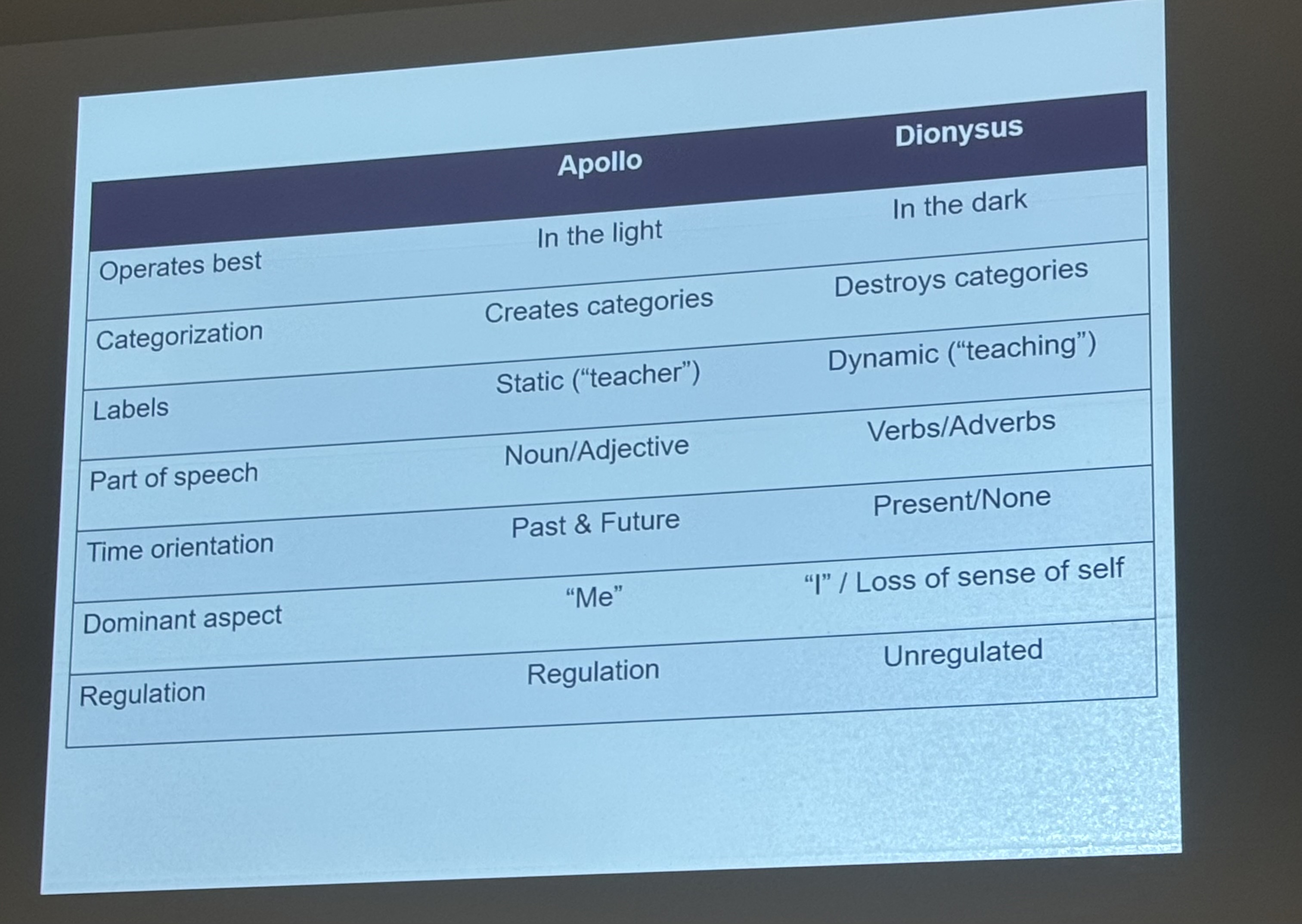
Hypothesis 2: We often don't know why people do what they do
Conscious experience is constructed and not always accurate
we are unaware how situational factors drive our perception
unaware that our own goals and needs alter our perception of others
We are also inaccurate about why we ourselves do the things we do
Hypothesis 3: We don't know what we don't know
Information is not always available but our brain confabulates (invest stories and fills gaps)
blind person not knowing they're blind
We are built not to know what we don't know
snake, people scared even though they are not always in a harmful situation
We often dont know the bias in our judgements because they are made automatically
we SEE dangerous snakes
we SEE rude behavior and rude people
Hypothesis 4: It is amazing that we are as accurate as we are about why people do what they do and what kind of people they are
Our judgements are often accurate because they are made automatically
Hypothesis 5: People have two fundamental social motivations
People want to be liked and have a need to belong
People want to be accurate, consistent, and authentic
do you tell oriole they're wrong or do you not and try to fit
Prisoners dilemma: both people play game but they don't knock or know one another; can be selfish in gains @ expense of other person; Wall Street game: 68% selfish, Community game: 28% selfish
Adaptive Errors
ABCD, 11 12 13 14
Help to understand the communicators intent because we make the same assumption in interpreting as they do in creating their message
Spontaneous interpretations leave out key info that can get us into trouble
Prisoners Dilemma
two people playing the game, offering selfish gains or even gains
calling it different titles cause different results
68% of people are selfish when it is called the street game
28% played selfish when called the community game
Reasonable Person Standard
relates to the Milgram's obedience to authority
we use ourself as the reasonable person
we base others on ourselves
carlin's law
problematic for Milgram
inaccurate estimate of what we would do
don't realize most of us would be in the "highest bar", highest level of the shock
the 255 people are the best in society
Slippery Slope Effect
In Milgram test, it only increases by 15 volts so this is not as significant enough to make you feel like you're doing something wrong
you would have to condemn yourself for what you just did before - we don't like doing that
Situational Factors on Subjects
they change the way subjects SEE their choices, changing their subjective construal
authority allows them to see themselves as not responsible
proximity changes the experienced force of authority
slippery slope
Why We Misjudge Others
we have the wrong model/ theory of experience and seeing
we think we record reality as it is
believe our mental representations perfectly mirror reality
believe it should be true for rational others too
Smart Phone Model of Seeing
objective reality -> we believe is accurate seeing and beliefs
naive realists believe this
Constructive Model of Seeing
objective reality - (filters: expectations, beliefs, associations, motivations (invisible)) -> biased seeing and beliefs
biased not bad
bias- can be bad but not instinctly bad, valuable
Situations
The immediate physical and social environment
Who and what are around you
The implied physical and social environment
What you believe others are thinking and how they might
respond to youThe significance for you determines the meaning of the
situation and is often invisible to observers or even to youYour internal mental situation: Your own expectations, associations, and recent thoughts
Subjective Construals
construe means to interpret
How we interpret reality
refers to the way each of us as an individual interprets what we see around us in the world
differs person to person (culture to culture, race to race)
particular in social domain where ratio of seen to unseen elements is worse
often automatic
we don't 'see' reality first and then add interpretation and evaluation, is constructive all the way down, even V1 is sensitive to expectations
Is not bad, is amazing. isn't a pure reflection of 'reality'
makes the ambiguous content of the world coherent without effort
To believe SC is an ERROR
Subjective Construal Example
Dot moving across the screen
All dots were separate dots, but our brain tells us it is moving across the screen
motion pictures
you 'see' things moving around the screen even though it is a series of still frames
Naive Realism
disbelief/ alief, in (or non-appreciation of) subjective construal as the fundamental nature of experiencing reality and as naturally varying across people
alief is an automatic or habitual belief- like attitude (automatic belief)
acting as if you have a belief even if consciously unaware of it or deny it
refers to mistaken belief that what we 'see' is reality and takes no account of the construal process
IS AN ERROR
Chair Illusion (Naive Realism)
we think our view of a chair is the "correct" one, ignoring other perspectives.
Color Consistency (Naive Realism)
we believe the color we see is the true color, even if lighting changes it.
Consequences of Naive Realism
Empathy Gaps:
we are NR 99% of the time
can't imagine other people having different experiences than ours
ex. tapping demonstration of American song (knowing vs. not)
you can't empathize with other group because you didn't have the same experience
"curse of knowledge": creates empathy gaps, knowing more makes you understand others less
More Consequences of Naive Realism
Consequence 1: We judge others with different perspectives more harshly than we should
Law of Crazy, Mean, Stupid, Biased or Lazy
Consequence 2: Without checking, assume that others know what we know and believe what we believe
Makes us bad at teaching and empathizing
Consequence 3: Fail to recognize our own bias because we are the reference point
Tapping Demonstration
Empathy Gaps, curse of knowledge
People who know the name of the song overestimate how many people will be able to identify it
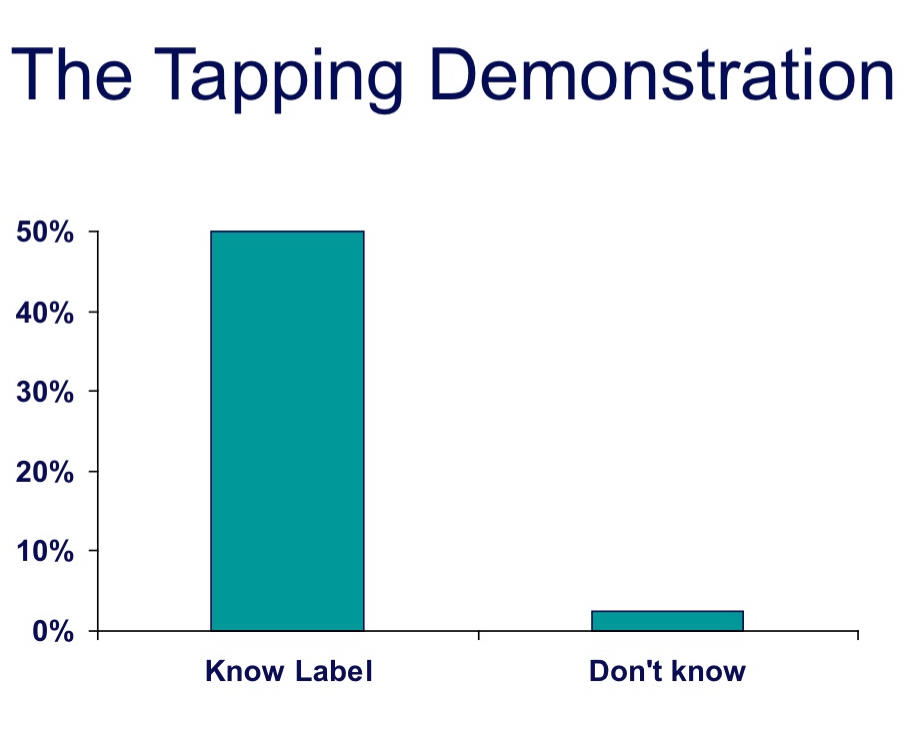
Empathy Gap
Difference between two peoples current states that make it difficult for one person to accurately understand or empathize with the others state
Law of Crapid
people call one another crazy and stupid when they don't agree with one another
twitter arguments
Sacred Values
some things have a price, sacred things don't
"perception of reality" can make the smallest debate sacred
we gave a sacred belief that we see reality as it is
"Sacredization"
temporarily acting as if something trivial is sacred. sacred subtext is may belief that I see reality as it is
Distrust of Unbiased Sources
News outlets:
used to be one single truth, now there are right and left news outlets
Relation to Naive Realism:
Hostile media effect 1985: people saw unbiased news outlet and the pro-Israel and not pro- I thought it was bias to the other side
people think that everyone below them is against you (0-point scale)
we think we are the reasonable person starting at 0
Hostile Media Effect
Liberals think CNN is conservative, conservatives think CNN is liberal.
Pro-Israeli people only view others as Pro-Israeli if they are more Pro-Israeli than them. Everyone else is viewed as Anti-Israeli
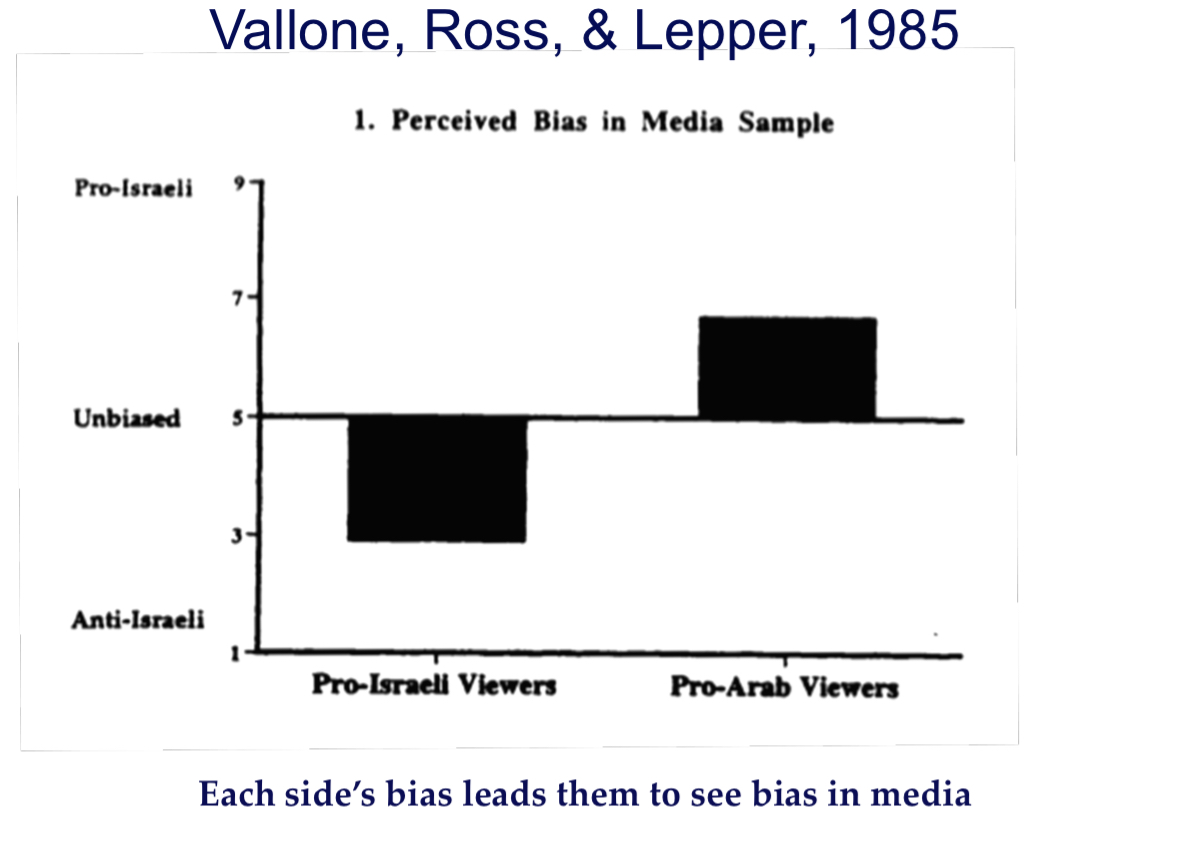
Donald Study
"Perception, then "reading comprehension" tests. Words primed in the 3rd, 5th, 7th, and 9th slots (had to memorize 10 words)
People who were primed with applicable words, whether positive or negative, were highly affected in their interpretation of Donald.
People who were primed with non applicable words were not particularly effected
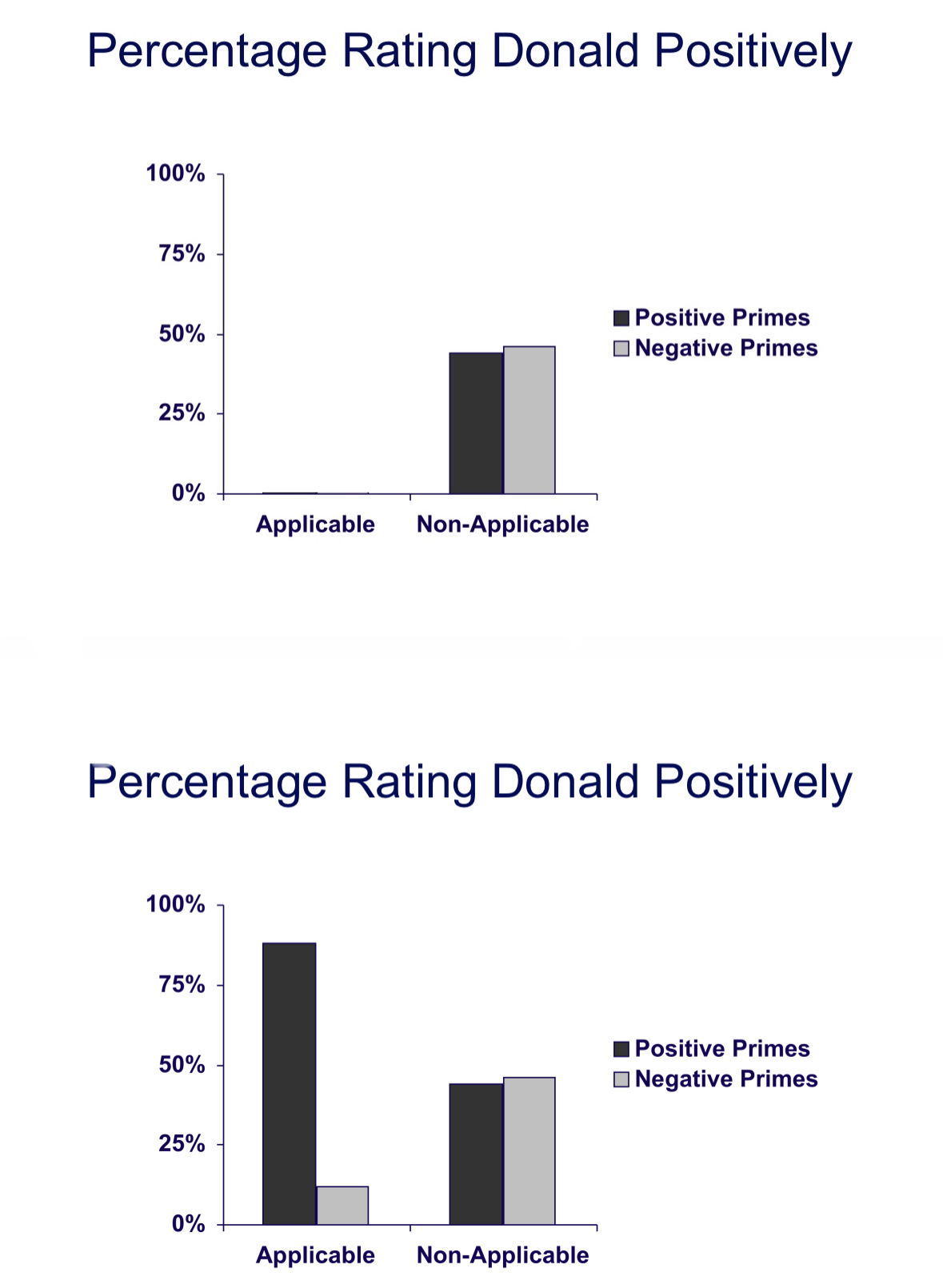
Donald Study (Subliminal Priming)
Press a key as soon as you see a flash
Flashes masked subliminally presented words
20% or 80% of the words were hostility primes 'hostile', 'rude' 'whip' 'punch'
Read 12 sentence paragraph about Donald ambiguous to hostility
People with more hostility primes rated him as more hostile
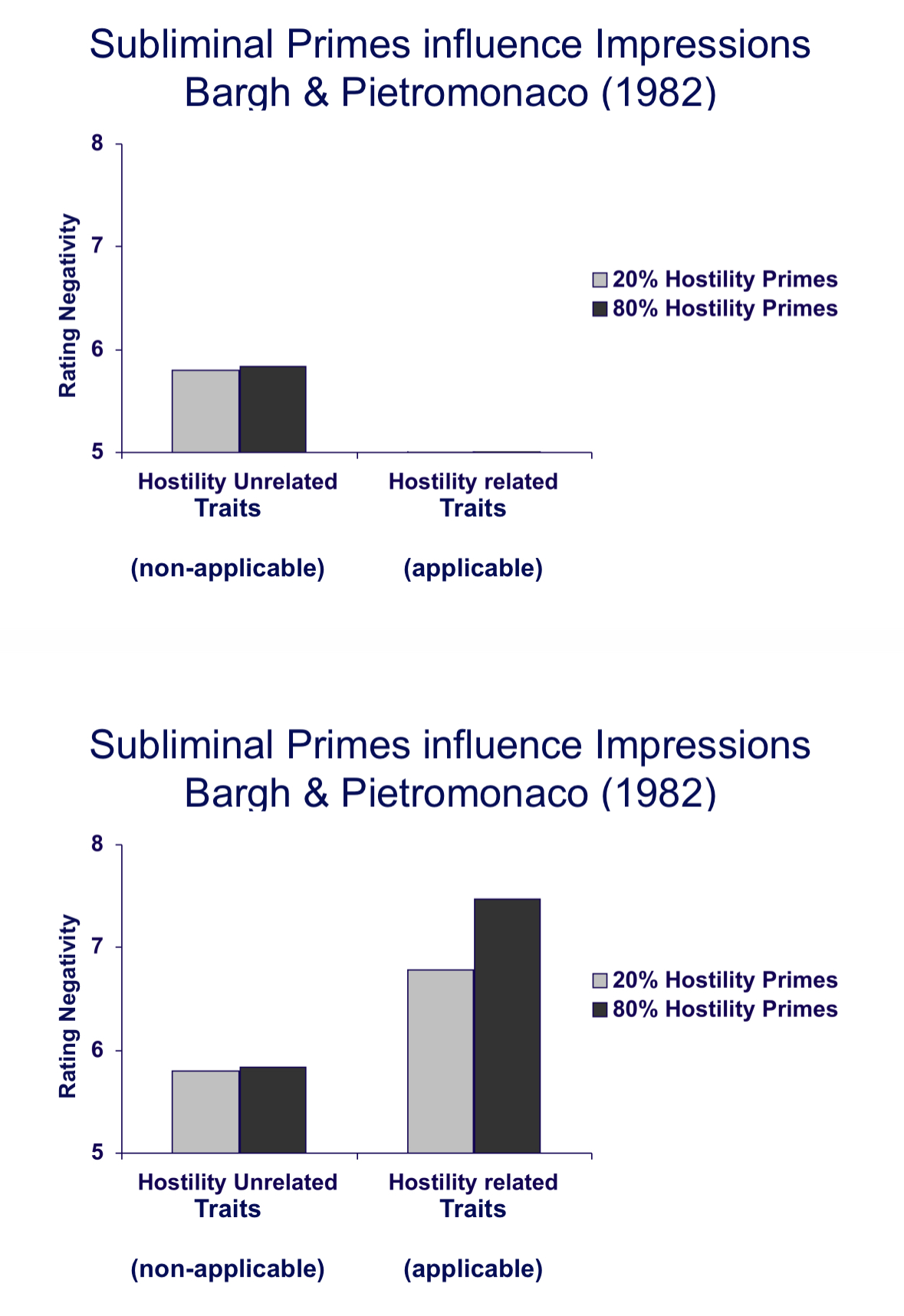
Bias BlindSpot
everyone thinks that they are right and everyone else is bias
Not Seeing Bias Study (Pronin, Lin, and Ross, 2002):
Self was rated lower on self-serving, bias attributes than what the average American was rated
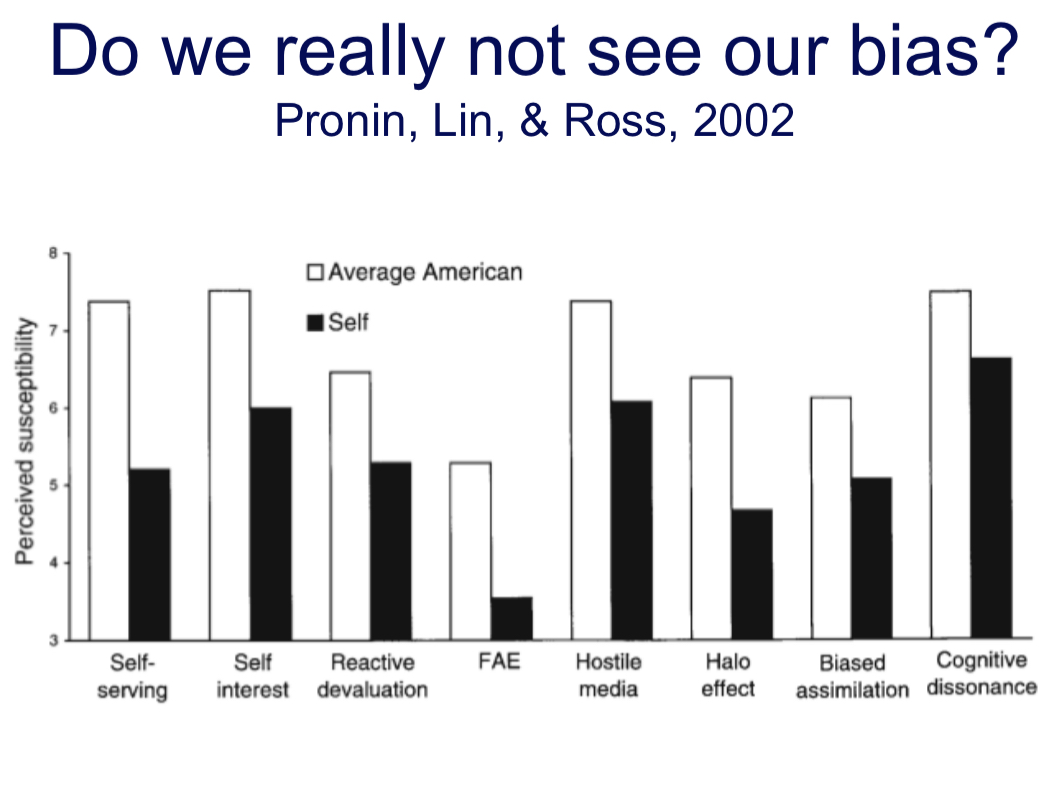
False Polarization
idea that people think they're further apart on issues than we actually are
ex. one is craypid bc pos group membership
you will misperceive most things relevant to group agenda
creates sense of polarization -> inability to find common ground
Liberal and Conservative example
affirmative action: thing those support aa, are pro choice. both groups are actually very close in pro choice views
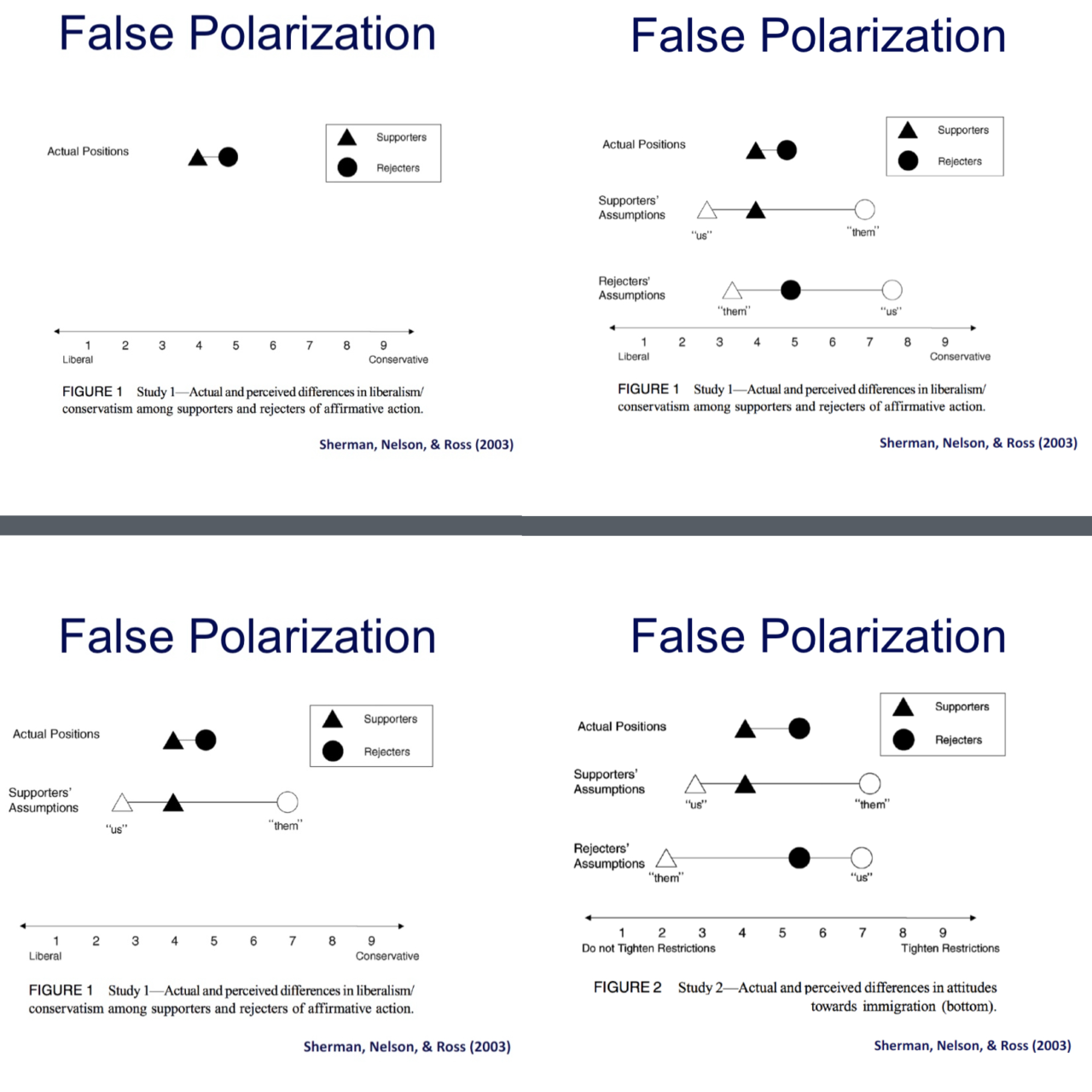
Real Polarization
bubble living, rely on sources from bubble only
harsh separation on the belief that the opposite side is extreme
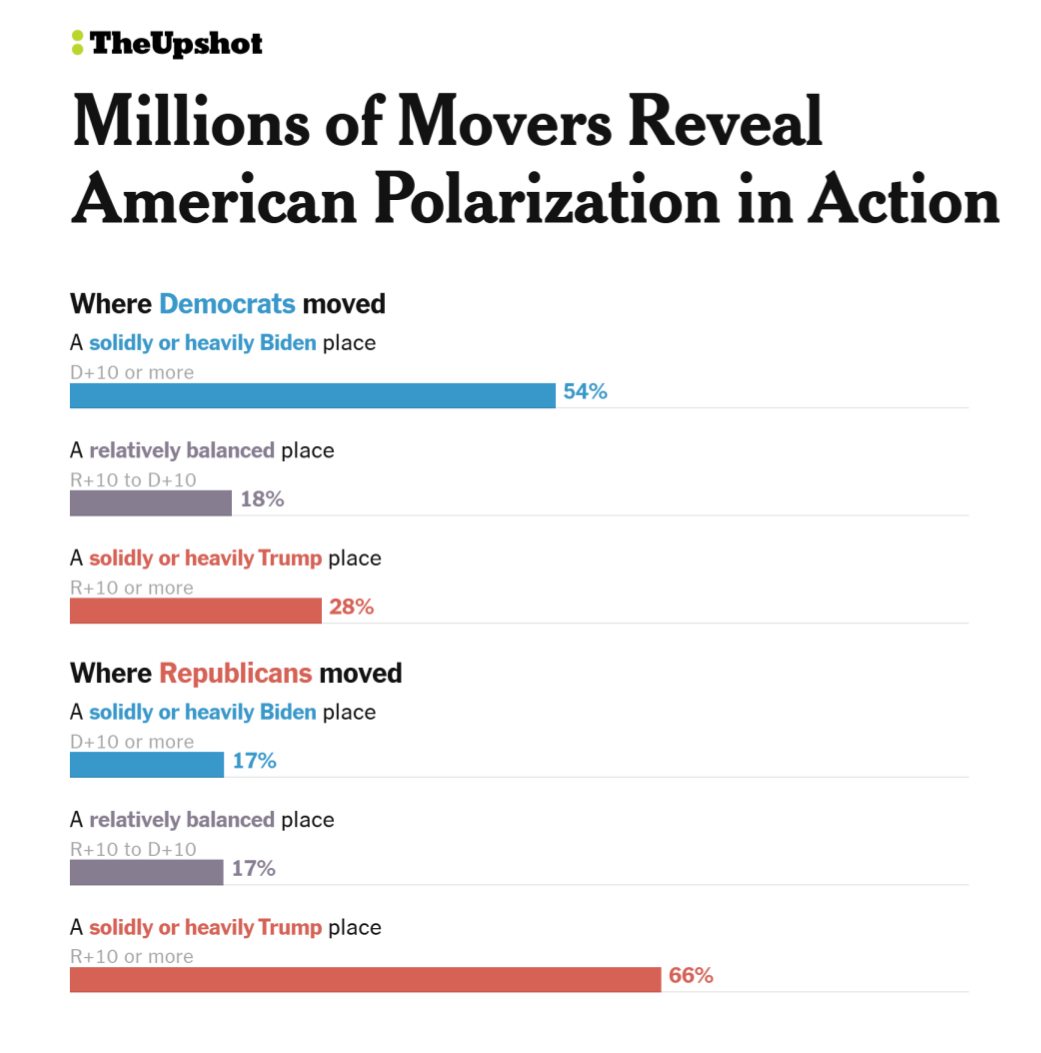
Asian or Female
Priming with "asian" led to better performance on a task.
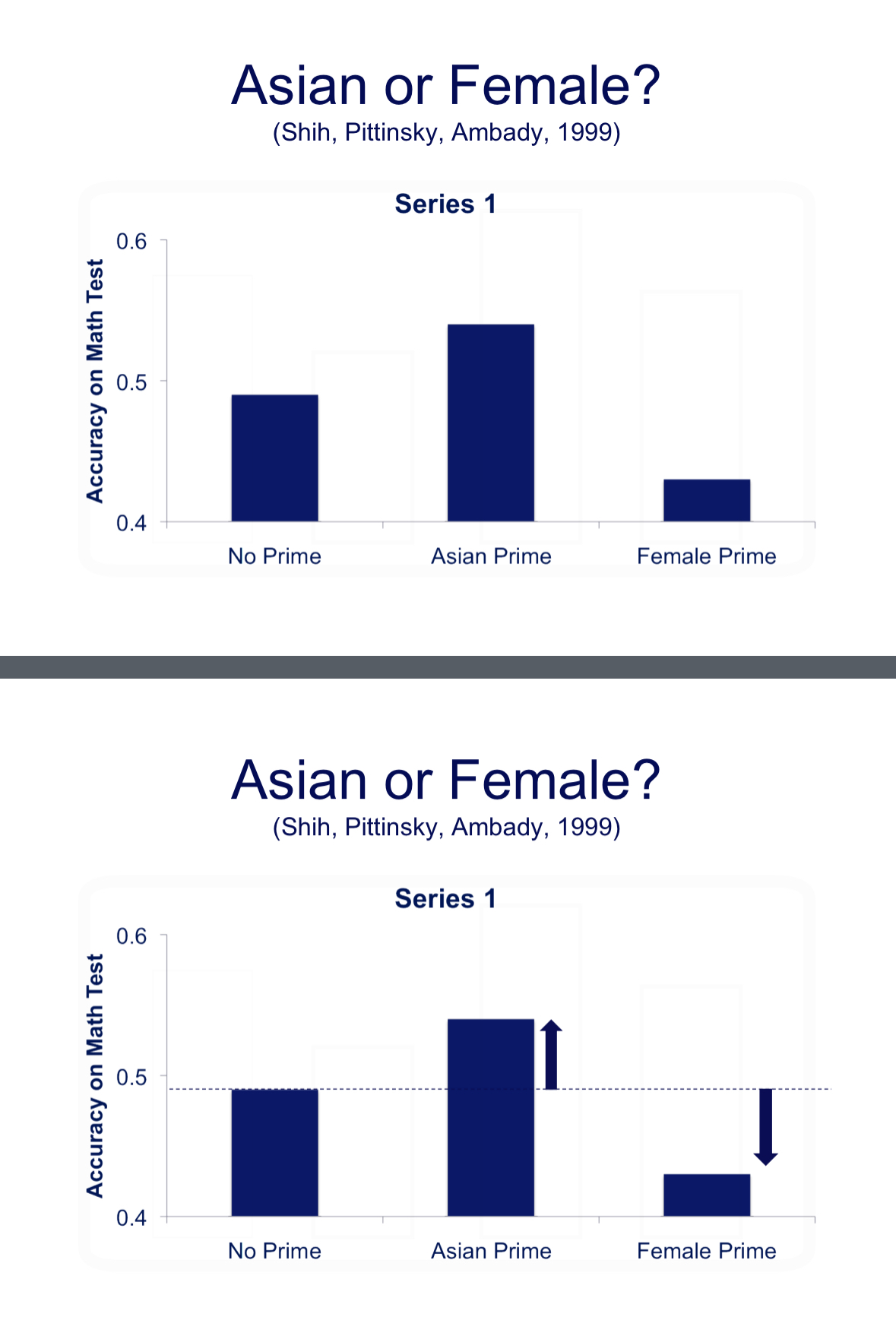
Cross-Idealogical Conversations (2022)
We have negative, and often incorrect perceptions about our ideological opponents and this leads us to avoid them.
Dropped out participant saying they could trust the other and being afraid of them not acting rationally
In reality, people found conversations to be more enjoyable, less stressful, and with half as much conflict as expected.
They tended to like their partners and found them to be more logical and less emotional than expected.

Contact Hypothesis
sustained intergroup contact reduces prejudice, but effects are mixed in fragile/conflict settings.
requires equal status, common goals, cooperation, and institutional support
Goldilocks Story of Automaticity
-Freudman - unconscious thought (too smart)
simple associations (too simple)
Dynamic pattern completion (just right)
media, perspective-taking, & elite cues
media shapes attitudes when promoting empathy.
perspective-taking and elite cues (leaders promoting unity) reduce prejudice.
Dynamic pattern completion
bicycle behind wall and you expect the rest of it to be completed the way you normally would
could have come from a museum with half everything and maybe you wouldn't expect to see the other half
have normal expectation that the other half of the bike would be there
lots of competing inputs
some constraints harder than others
constraint satisfaction resolves
Pattern satisfied the most constraints wins (most of the time)
Long term associations get updated (changes landscape)
Largely happens automatically
ex. red square - can't choose how we see it vs. long division problem
Contact and Exposure
mere exposure without interaction can worsen prejudice, especially if superficial.
inclusive national identities→ unity and reduces tensions.
structural policy changes are needed alongside grassroots efforts to address prejudice.
investment in meaningful contact→ understanding
constraint satisfaction
process of computationally trying to satisfy as many of the constraints as possible to reach the best global construal / pattern
looks for pattern that produces the least tension across all constraints
soft constraints can be overdid/ updated
can visualize as a landscape where low points are lower energy/ tension states
Multi dimensional representational states
think man is honest (low)
find out he's dishonest (low)
much harder to go uphill than downhill
diagram in the slides
Attractor States
once you get close to attacher, self perpetuating features of associations draw you to center
much easier to get into an attacher state than to get out of it, takes less energy
ex. Perspective study (Anderson, Lepper, Ross):
" bad at math" , disbelief in study to give them insight and "fix study" -> after people felt worse about math
you put yourself in the well once it is started, but it is hard to get out
like subjective construals: hard to imagine other ways of seeing things
Asch (1946) Study
read list of words describing a person, but in opposite order
( intelligent, industrious, impulsive, critical, stubborn, envious)people described the person they thought the words described and one was positive and one negative
Wells, global minimum, local minimum
attractor states don't guarantee "truth"
They guarantee a greater sense of coherence/ low tension than nearby states
DPC explains how we "see" full bike from partial
In social realm, we "see" mind from behavior only
Four Horsemen of Automaticity
1) doesn't require intention
doesn't change if you see red square or not
2) doesn't require awareness (of the process)
don't know brain processes
3) doesn't interfere with others
can listen at the same time, see background of slide is white
4) doesn't require effect
forms of automaticity
perceptual, semantic, social
Priming
the activation, often unconsciously, of certain associations, thus predisposing one's perception, memory, or response
asked for a woman name without prime, then told name Romeo and people are more likely to answer Juliet
facilitates automatic processes
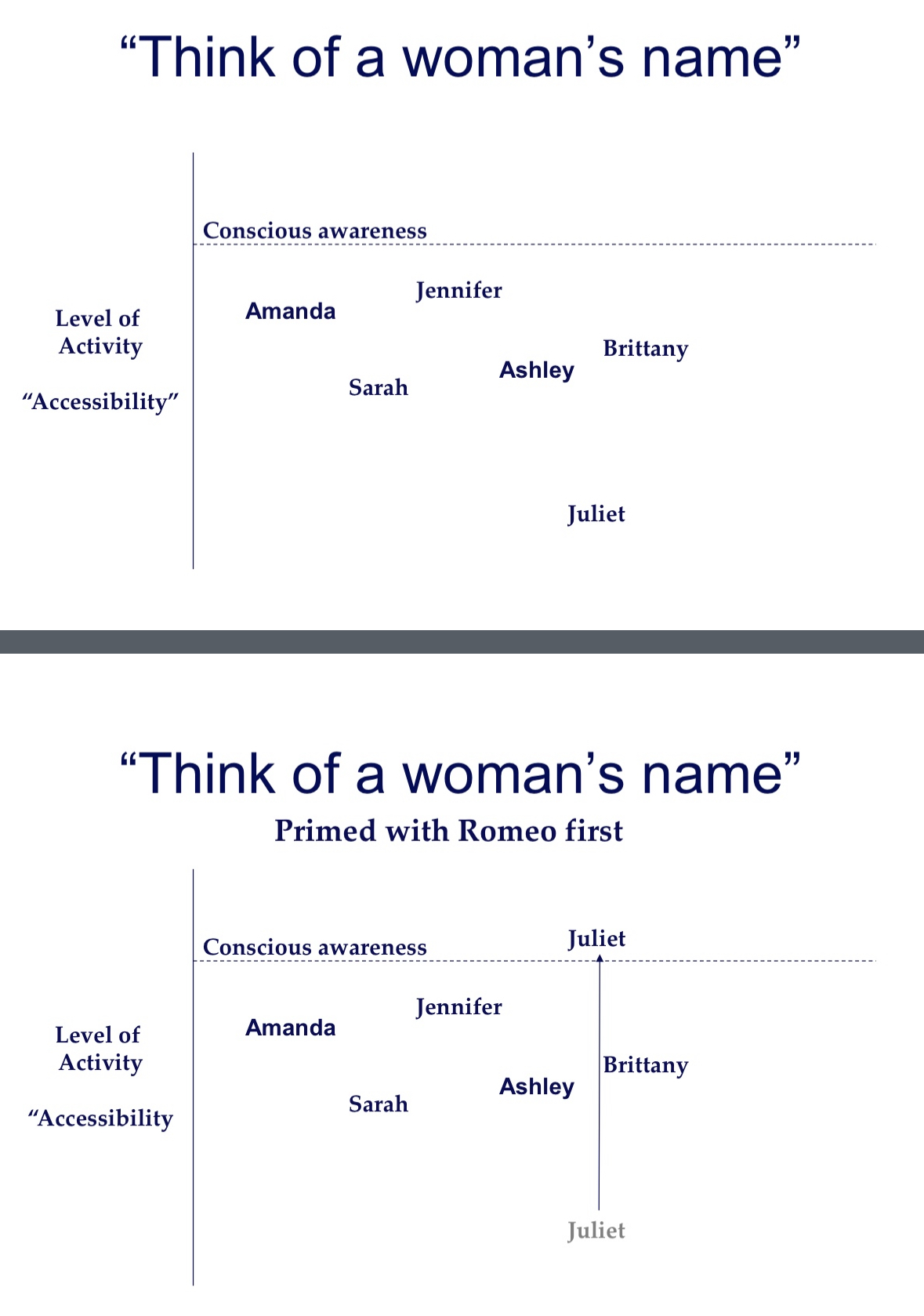
Problems with Priming
research primes one thing and show its effects in isolation
suggests static automatic effects
in reality, 100s of automatic processes bump against each other simultaneously
they vote collectively and constrain one another
reality is more dynamic
subliminal priming
things that happen all the time that are not in your conscious awareness
non-subliminal priming
mostly primed by these (library)
can be detected and counteracted
effects a bit larger than subliminal
what matter MOST is being unaware if the primes PURPOSE, not being unaware of the prime itself
Subliminal vs. Nonsumbliminal Priming
Non-subliminal priming effects a bit larger
But, only non-subliminal priming can be detected and counteracted by target
In real life we are mostly primed by non-subliminal primes (i.e. situational cues like being in a library)
What matters is being unaware of the prime's purpose, not being unaware of the prime itself
Priming works better in ambiguous situations
Where does automaticity come from
unintentional / incidental practice and exposure
cultural norms
developing your native language
nonverbal communication
Intentional practice
typing
musical instruments
sports
study/ dietary habits
Why Automaticity Matters
Situations alter our subjective construals without our consent
9/11 and George W Bush
Advertising effects
Reliable and efficient
most of the time useful (library)
lab studies make us look irrational. We are smart but not perfect.
Moral responsibility?
We don't hold people responsible for automatic mental processes
But we assume too little is automatic because automatic behavior can look intentional. Don't recognize automatic influence of the situation
Hamsters Consciousness
Hamsters are conscious but they cannot think (thinking is processing and forming logical conclusions)
Conscious vs. unconscious automaticity
not usually antagonistic (freud)
unconscious processes offload habitual repeatable mental acts so our limited conscious thinking can focus elsewhere
background auto processes work together, dramatically to give us rise to our conscious experience
why automaticity matters
situations shape our subjective construals with our our consent or awareness
Pre reflective consciousness (immediate experience)
stream of consciousness (William and James 1890)
perception (broadly) driven by automatic construals
seems like reality
lots of simultaneous automatic processes
not recognizing something walking down a hallway
Outputs of prereflective processes feel like they happen to us (perception/emotion)
MOST ANIMALS
reflective consciousness
'thought'
reflections on the stream of consciousness
has the quality of aboutness thoughts are about something)
controlled processes: we experience reflective construals as some thing we control
only one controlled process at a time
like the movie critics who think about the movie and reconsider small segments over and over in order to analyze, evaluate, and consider alternatives. It can be summarized for others
Outputs of reflective processes feeling like something we do (thinking/deciding).
HUMANS (possibly only us)
Stream of consciousness
like how most of us experience movies most of the time. Lost in the ongoing experience
Controlled process
are intentional
involve awareness
require effort
interfere with other processes
tend to be linguistic (can be described in words and propositions)
experiences as 'my mental work' under my control, not reality out there
special but limited resource
ex. counting backwards by 7s from 16,358
Ego (Resource) Depletion
See very sad clip, then solve anagram
much slower
like a muscle for controlled processes; it tires out after awhile. Using it over and over may strengthen it over the long haul
False Logic
Elevator Logic
Is she a witch?
just because we use controlled processes to reach these conclusions, does not make them correct
social psychology
knowing others
knowing how others know us
Automaticity and Control
controlled processed the have the appearance of rational thought can actually be biased/ irrational/ incorrect
we all have countless beliefs about people
we can even specific the rules and conditions so they could sound logical
lots of well- specified theories are wrong
sounding logical doesn't equal logically sound
elevator logic examples
okay to go to high floors starting at 3
0 wrong to just go to two or to take it down from 2
we don't know the circumstance of the people getting in the elevator
false consensus effect
we think there is a greater consensus of your view than there actually is
ex. wear sign for $50, those who say they will wear sign will say that they think more people would also say yes
people are more likely to do it with someone they know
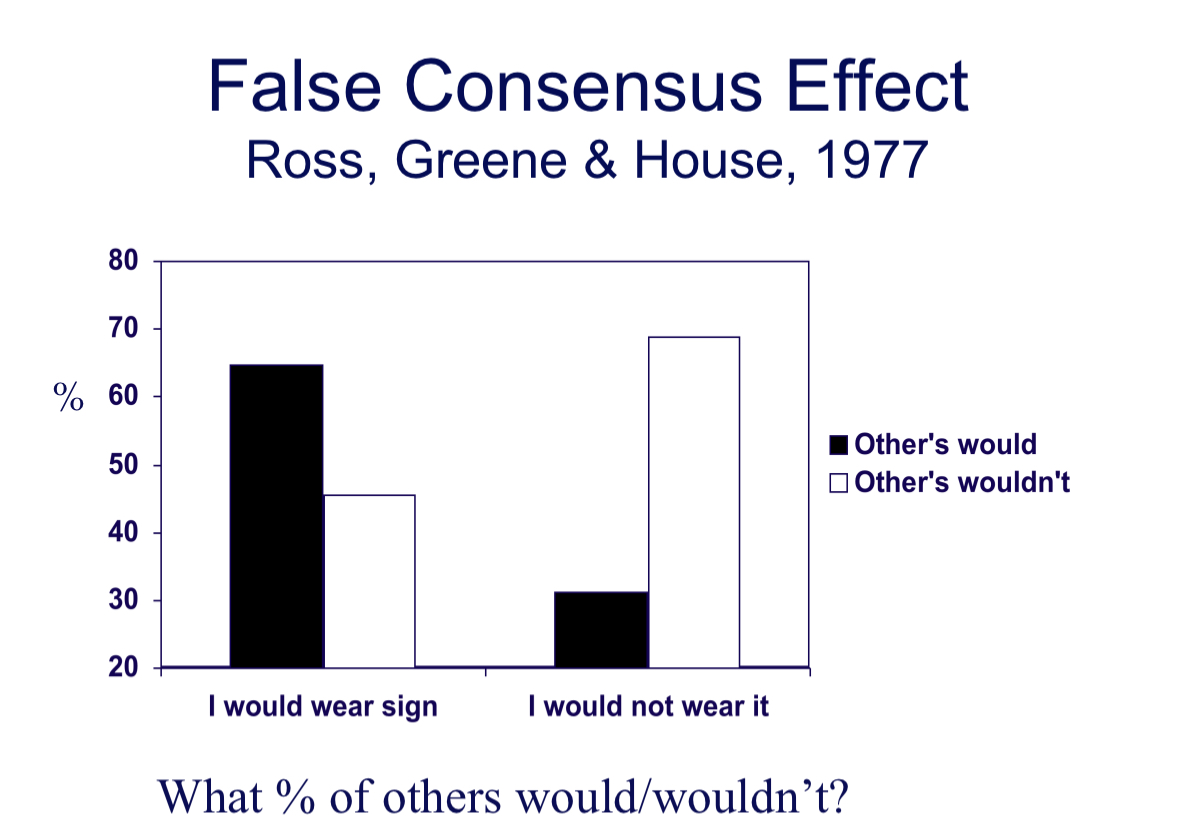
Purple America
We have gotten less diverse over time (less purple, more red and blue)
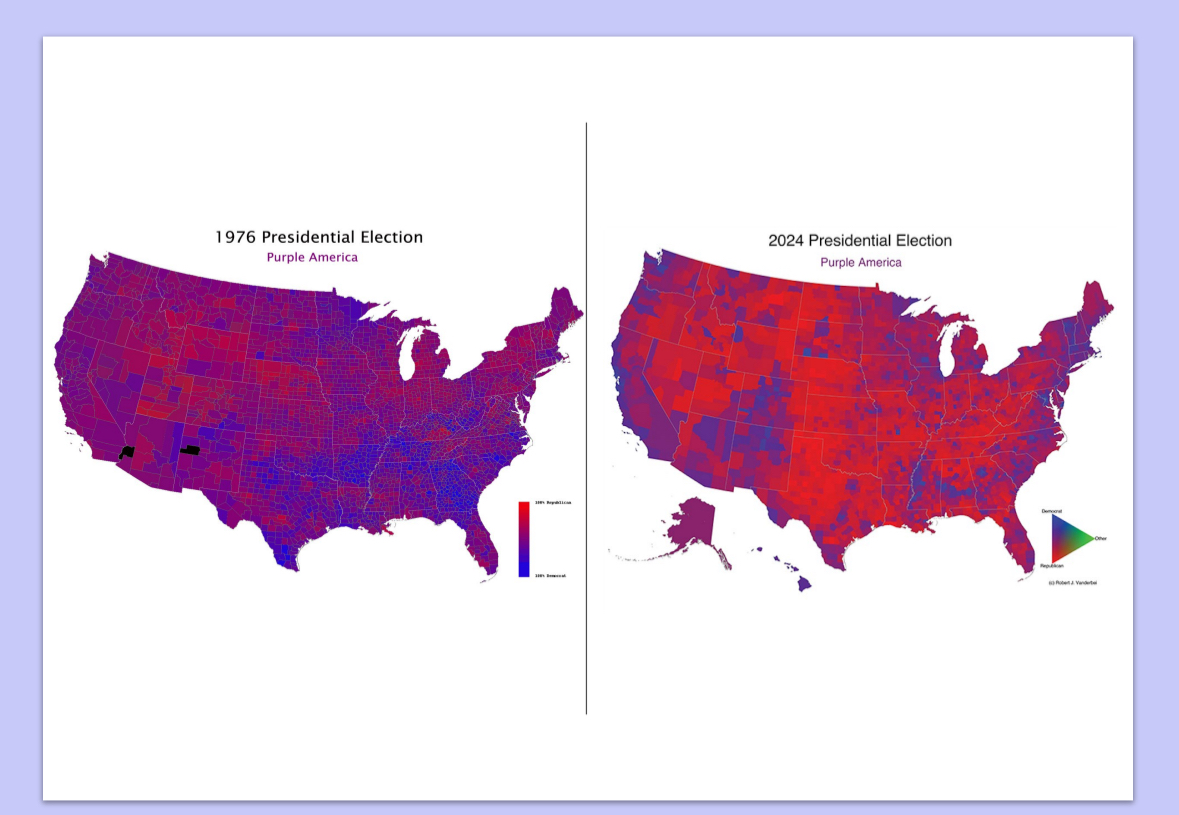
Diffusion of Responsibility
the tendency for individuals to feel diminished responsibility for their actions when they are surrounded by others who are acting the same way
How do people decide what others would do
subjective construal: pre reflective
how did you imagine the event
reasonable person standard: projection
pre reflective and reflective
intuitive scientist: reflective consciousness"what would others do"
why will this question get is into trouble even though we know how to protect from ourselves
cognitive load
require you to do one thing that requires controlled processes that require you to do a second thing
rehearsing a 9 digit number
monitoring a certain cue (tone, letter, dot)
time pressure
if an effect gets slower or less accurate under cognitive load, it likely involved a controlled process
impairs controlled processes
Crying Baby Dilemma
Utilitarian choice took longer under cognitive load
If actions take longer under cognitive load, then they are not automatic (utilitarian choice is not automatic). If there is no effect, then they are automatic (nonutilitarian)
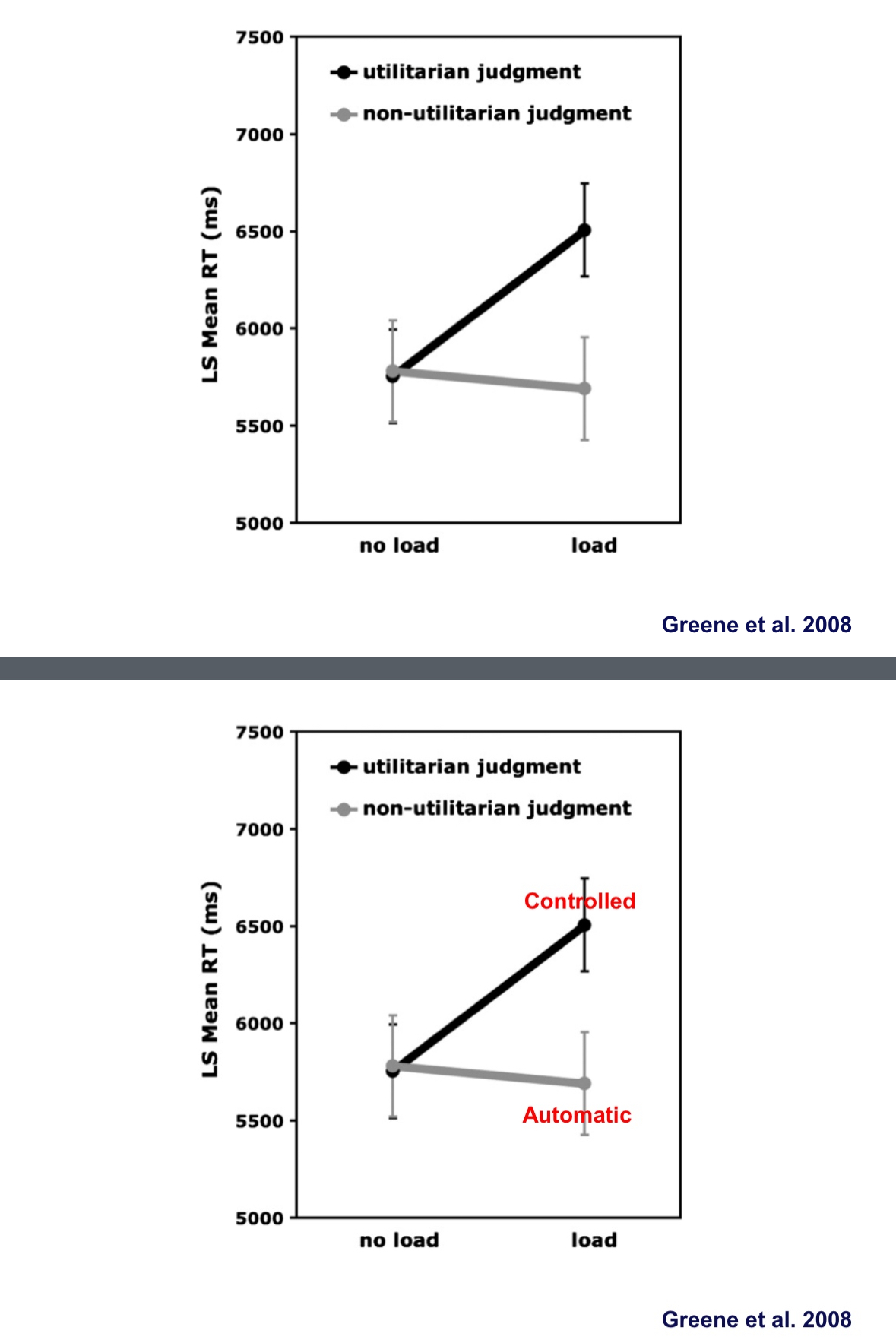
Rudeness Study
Told to do task then find experimenter down the hall. Those primed with "rude" words were more likely to interrupt.
Trivial Pursuit
Primed by picturing a day in the life of a professor or a supermodel, then asked a question. Supermodel participants got it wrong
Coke Priming 1950s
Unsuccessful
Drive or behavior must already be
present or occurring in some formPriming can nudge the exact form the behavior takes
Can't make you play trivia game, but can change how you play if you do
Impression Goals and Memory Goals
Primed with impression goals and memory goals in one level, and in the other level were told to form either impression goals or memory goals. Results were about equivalent, showing that priming was just as effective as telling them
Directors test example (cognitive load)
director asks you to move a certain item in one direction (up, down one box, etc.)
viewer must think of the directors view before moving the object because they may have a different view
easy trial: relatively automatic process
hard trial: depends on controlled/ effortful processes
effect gets larger when there is cognitive load
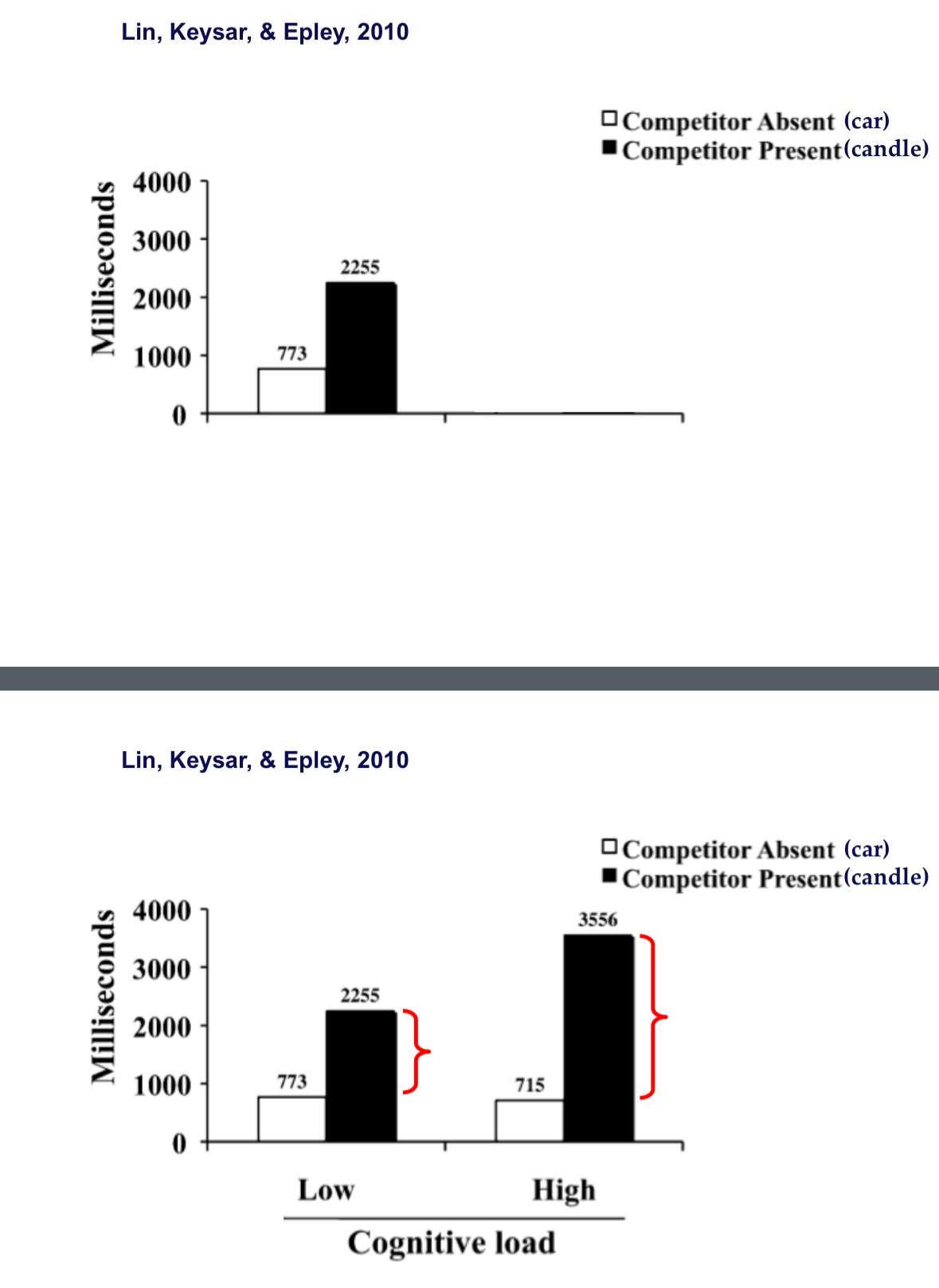
Kleck and Strenta (1980) scar study
half subjects had makeup scar
subject interacts with partner
subjects rates partner during interaction (tenseness and patronizing)
scar was imaginary
thoughts about the 'other' knowing that were have a scar changed how we interpret their behavior
Assimilation/ priming effects
automatic effect of a reflectively conscious thought
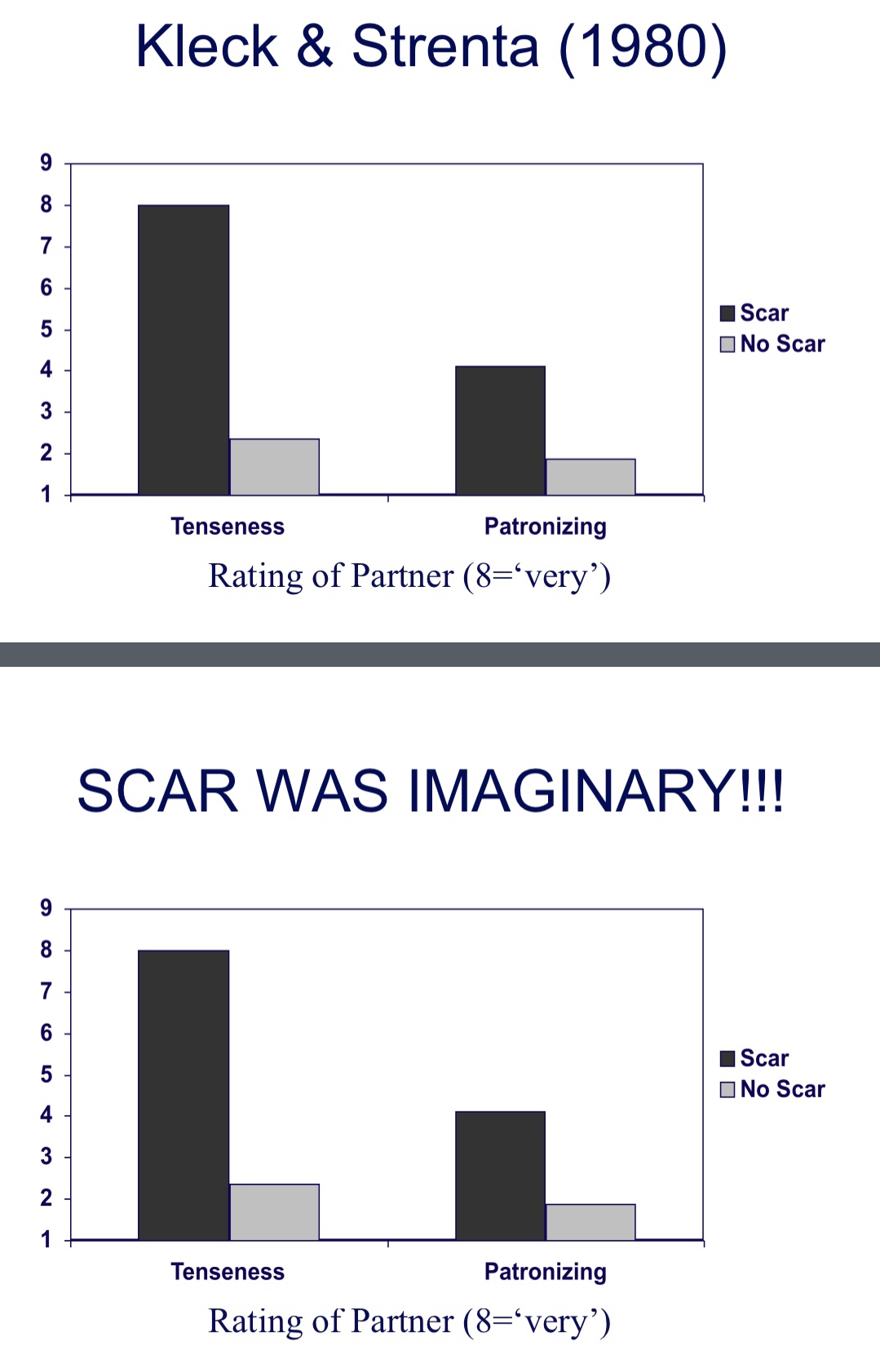
Thinking about others awareness of us
powerful social force that affects our behavior and judgements
requires controlled processing
impacts us less when we lack controlled processing resources, suggesting that we need controlled processing and to use this information
alcohol, drugs, & sleep deprivation
more free to be ourselves (????
Spotlight effect
belief that they're in the spotlight, but everyone thinks this so most people don't notice
most predict that a high percentage of people will notice things "out of the ordinary", but that may just be in their mind that it is not ordinary
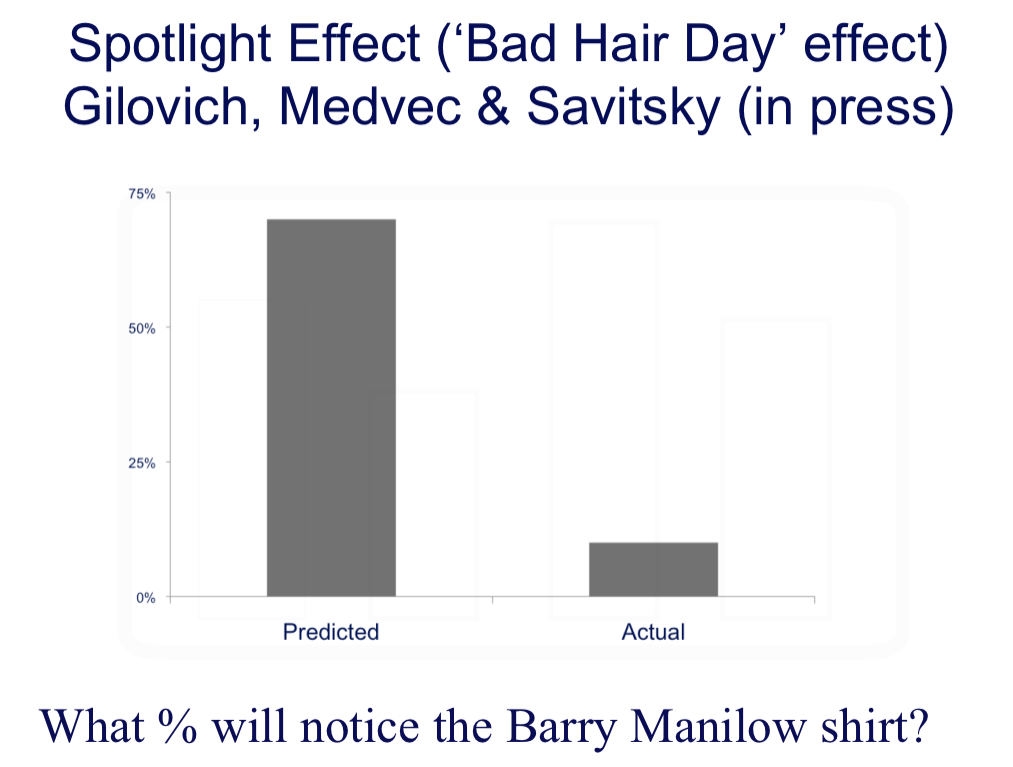
reflective/ controlled processes
essential to combining info in novel ways
essential to planning
essential to decision making
essential to explainingBUT
limited (1 per customer at any one moment)
not immune from error (elevator logic and introspection)
Judging the President
When laughter responses were edited out, Reagan's ratings went way down
Milgram Obedience to Authority
150v- complains of pain (none stop)
160v- pleads to be let out (none stop)
300v- screams and then never heard again (32% stop)
Reasonable Person Standard: we think anyone who would do worse than us is cruel. We also inaccurately estimate what we would do, misunderstanding their situation
Actuality, people went way further than expected
We don't account for Proximity, The Power of Authority, and the "slippery slope" effect and our need to appear consistent with ourselves
compare one's next behavior to the last. Not thinking of absolute value of shock level (slippery slope)
Compliance Movie
People continued to do what the person told them to do because they thought he was a police officer
McGurk Effect
Ba sound makes Fa sound if played with person making that gesture with his lips
Who Am I (I… Statements)
What is similar about your response:
Static, observable facts – positive traits
Generalization, abstractions (teachers, not teaching)
Many answers could describe lots of people in here
What is missing:
Flow of ongoing experience
I am hungry… tired
Hopes for the future
I hope to go to graduate school
Defining ourselves from the outside
Paradoxical Self Metaphors
Self as controller and controlled
“I dragged myself out of bed”
“I let myself go”
Self as geographical location
“Are you out of your mind?”
“I’m really out of it today”
Self in conflict with itself
“Why do you torture yourself?”
Song: “I am my own worst enemy”
Nightmares of Self
When you wake up, how do you know you are the same person you were before
Dark City clip
Are they “the same person” each day?
Would you be upset to find out that you had been someone else yesterday?
Why does it matter to us?
Knowing Ourselves
At the center of your being you have the answer; you know who you are and you know what you want - Lao Tzu
We have all a better guide in ourselves, if we would attend to it, than any other person can be - Jane Austen
often more theory bases than we would assume
acts as if we have direct access to 'self' rather than applying a theory
Our theories are often biased, hence other can apply better theories to us (sometimes) than we can our selves
we do have some direct access
what chocolate tastes best
Traditional View of Self
Private, sealed from the world
True source of who we are
We have direct access to this knowledge
Might have to develop this skill
‘Find oneself’
Knowing will improve our decisions
Know through “introspection”
Controlled Process (In Knowing Self)
Social Psychology Controlled Processes
Knowing others
Knowing ourselves
Knowing how others know us
Introspection
Turning our mental gaze inwards on ourselves
“the examination or observation of ones own mental and emotional processes"
who we are
what we look like
what were good at
what we value
what we believe in
what should we do
SPOILER ALERT Study
If you were reading a mystery novel, would knowing the ending lead you to enjoy the story more or less?
A) It would make me enjoy it less
B) It would make me enjoy it more
C) It wouldn’t affect my enjoyment
Could you be wrong about this?
YES, study found people enjoyed the novel more when already knowing the ending
Telling more than we can know: Nisbett & Wilson (1977)
For some, first task includes pair
“Ocean-Moon”
Second task - Which detergent do you prefer?
“All” or “Tide”
More choose Tide in priming condition
When asked why gave different reasons:
My mom uses it; It’s the most well known; I like the box
Hypothesis 3: Don’t know what we don’t know
The sorts of things I can find out about myself are the same as the sorts of things I can find out about other people, and the methods of finding them out are
much the same....
John Doe’s ways of finding out about John Doe are the same as John Doe’s ways of finding out about Richard Roe – Gilbert Ryle (1949)
telling good art from bad study
asked to look at Monet painting vs. cartoon poster
rate each one: 1/2 asked how much you like them, 1/2 asked to introspect on their reason and make a list or reasons
with introspect: they are closer in rating
a week later, they change their minds back to monet: regret, introspective error
Introspective error
Easier to generate list for cartoon
You are substituting the list you’ve made for your own affective response
Its as if you handed the list to someone else and they had to guess your preference
We’re guessing our own preference the same way
Introspection does not always reveal “privileged” information
Choice Blindness
Subjects given a choice b/w 2 photos
Magic trick is used to give theme a different one
75% blind to mismatch, but 84% predict they would notice
They confabulated explanations for so called choice
Say i prefer blondes, then justify choosing a brunette when switched
Making ease of introspective access for truth (Schwartz et al 1991)
Either think of 6 instances when you were assertive or 6 instances when you were unassertive
How assertive do you think you are in general?
Either think of 6 instances when you were assertive or 6 instances when you were unassertive
How assertive do you think you are in general?
What if you think of 12 instances instead of 6?
List 6 or 12 instances when you’ve been assertive/unassertive
Pretests show generating 6 is easy, but 12 is hard
Imagine Judging Someone Else
One person easily & quickly generates a time they were assertive
Another person has difficulty generating a time they were assertive
Who would you judge as more assertive?
We judge ourselves the same way
Switching from 6 to 12 instances moves us from the first group to the second